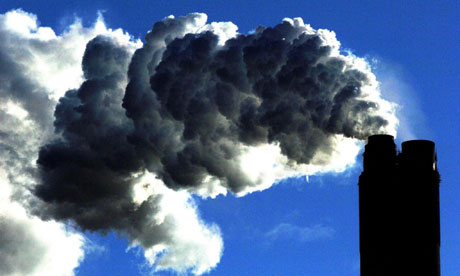So, after Cancun, the current UNFCCC proposed solutions to climate change rely almost entirely on carbon markets to reduce emissios - and voluntary reductions - because not only are they currently trying to gut the Kyoto Protocol, they are trying to implement the so-called Copenhagen Accords (which the first stage are the Cancun Agreements passed last year). Yes, I'm simplifying.
Like Where's Wlado, but not nearly as much fun or educational.
http://www.guardian.co.uk/commentisfree/cif-green/2011/jan/24/carbon-market-c...
The carbon market – gone in a puff of smoke?
The loss of carbon credits worth €28m to cyber attacks lays bare the faults of a highly flawed trading system

- guardian.co.uk, Monday 24 January 2011 14.00 GMT
 The carbon market has grown to gargantuan proportions – worth €92bn in 2010.Photograph: John Giles/PA
The carbon market has grown to gargantuan proportions – worth €92bn in 2010.Photograph: John Giles/PAHe wears a fine cloak, sword at his side, clearly a gentleman of standing. Behind him, representatives of the church expectantly peer out of heavy fur-trimmed garb. Once the money is paid (and it is, as always, a substantial sum), the gentleman's transgression, be it on the battlefield or in the local bawdy-house, will be forgiven. This is how indulgences were bought and sold in the 16th century all over Europe. The Catholic church would dispense whatever forgiveness was necessary in return for cold cash, saving many tortured souls from eternal damnation.
Carbon trading does a similar job, whereby money thrown at developing countries can somehow absolve polluters from their sins against the planet. In a bid to encourage companies to reduce pollution and fight climate change, they are forced to buy credits to cover their annual emissions. The less pollution they produce, the more unused credits they can sell back in the market. Even better, people like you and me can get involved too. Flying to Barcelona for the weekend? Just click the offset carbon emissions button, and wipe away any guilt.
Carbon credits can be traded in the EU's emissions trading scheme (ETS), but unlike other commodity markets, it's not clear that carbon credits are tied to something that will have value tomorrow, or next year. Can the credits be owned, like a piece of property, or can they just disappear into thin air?
And disappear they may. The entire EU trading system was shut down last Wednesday, with credits worth €28m missing following a series of highly effective cyber attacks that have plunged the still emerging carbon market into chaos. To make matters worse, the EU's ETS is a serial victim; eco-activist hackers shut down the EU carbon exchange website only six months ago. The European Commission's decision to suspend trading was taken in the wake of break-ins into online accounts in a number of European countries, with the Czech Republic being the latest casualty. The chances of recovering the stolen credits are slim, even more so once the criminals have sold them on. Unlike the money paid for indulgences, carbon credits are nothing more than records in an online account.
Where this leaves the man in the fine cloak is unclear. Those who dabble in the carbon market are vulnerable – whether industrial plants governed by the EU trading scheme or financial speculators wanting a piece of the carbon action. They thought they were buying real goods like oil or gas, which don't just exist on a computer screen. Right? Wrong.
Whether the market participants actually own the credits like any other piece of private property, or whether hackers sitting in their bedrooms can just wave their wand and make them disappear, is something that the EU ETS is strangely silent on. This is despite the fact that the carbon market has grown to gargantuan proportions – worth €92bn and accounting for 7bn tonnes in 2010 – and is the fastest-growing commodity market in financial history. But oil and gas are not hot air, and cannot be dissolved by a snap of the fingers (or a click of the keyboard). If the carbon market is to function effectively, its participants need to know what their rights are when they get involved in carbon trading. Simply issuing rights in air which may never be seen again is not good enough, and the commission should start addressing the dangers of a Pandora's box that's lying wide open.
On the other hand, if Europe were genuinely concerned about the environment, why should we cry over a few lost credits? Fewer credits in the market could do wonders for the environment, but would wreak havoc on financial markets, which could come tumbling down. But if millions of stolen credits flood the market, this won't help in the battle against climate change. It may be time to think about scrapping carbon trading altogether. The commission should have thought of these problems when peering out of its fur-trimmed garb and pocketing the cash.
This article was published on guardian.co.uk at 14.00 GMT on Monday 24 January 2011. It was last modified at 14.05 GMT on Monday 24 January 2011.
No comments:
Post a Comment